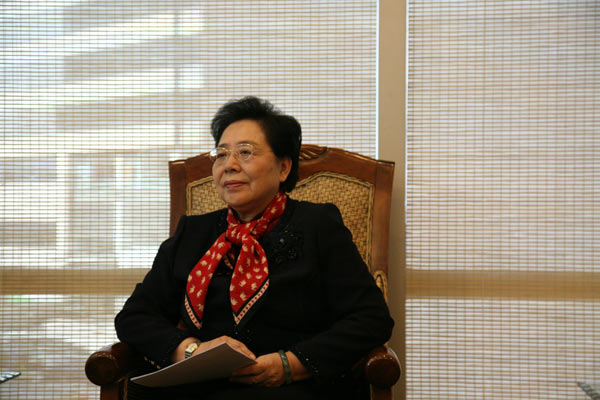
Meanwhile, younger plantings of the right species can be harvested for "very delicious" bamboo shoots in the following spring.
If you were harvesting trees that aggressively, your forest would disappear rather quickly. So harvesting more bamboo and using it to make more things is smart, sustainable forestry, she says. And while there was a public campaign against the waste generated by disposable bamboo chopsticks, those low-cost eating utensils don't pose a threat to the supply now.
 |
|
Jiang Zehui, Co-Chair and a founding member of international netwokr for bamboo and rattan. |
"The public today is much more tuned in to environmental issues, and people are more careful about waste," she says. More importantly, the bamboo industry has shifted toward value-added products, and there is more money to be made in quality building materials, for instance, than cheap chopsticks.
Jiang's life work has nurtured her early interest in bamboo in ways she never experienced when reading about the Grand View Garden or the Prospect Garden in the Chinese classic A Dream of Red Mansions, which she loves.
Late in her career, she co-authored Bamboo and Rattan in the World, which has become a leading guide to growing and commercializing bamboo, and the book was presented as a gift in 2002 to her elder brother, Jiang Zemin.
After congratulating her on the book's quality and comprehensiveness, China's former leader suggested that there might be room for another book. Why not a book of poetry - not for the wood scientist but for all those who savor bamboo's cultural mystique and traditions.
Soon Jiang Zehui was back in the "scenic heaven" of her youth, helping her collaborator, Professor Peng Zhenhua, to collect poems and literary references for the new volume.
"At first we didn't know how to proceed," she says wryly, since researching poets for the 2,000 years leading up to the Qing Dynasty wasn't as easy as searching online for "bamboo" today. She and Peng spent four years combing through Chinese archives - and about 10,000 poems and other literature - to make the final selections. Jiang's brother, whose enthusiasm for the project continued, offered 71 ancient poems to consider for the collection. That's how the resulting volume, The Charm of Bamboo, came into being.
A much shorter version of the volume, The Charm of Bamboo - 100 Selected Ancient Chinese Poems on Bamboo, was published both in English and Chinese last year to celebrate INBAR's 15th anniversary. Jiang Zemin penned a foreword to the book and contributed one poem himself in beautiful Chinese calligraphy: Bamboo in My Garden, a paean to Spring Festival in 2000.
The volume features 100 ancient poems and sold out of its first printing immediately. "It was a great success," she says, noting that. She is always eager to show visitors the work, including two of her own favorite verses, Green Bamboo House by Su Shi (1037-1101), and On Bamboo by Zheng Xie or Zheng Banqiao (1693-1765).
Her eyes light up as she describes Green Bamboo House, and visitors to her office can quickly sense her deep-rooted passion for the simple plant's cultural legacy.
Su Shi, the literary genius also known as Su Dongpo, wrote that he would rather have no meat on the table than have a garden without bamboo.
"No meat makes you thin," Jiang Zehui says, closing the book with a smile. "No bamboo makes you vulgar."
Contact the writer at michaelpeters@chinadaily.com.cn.







